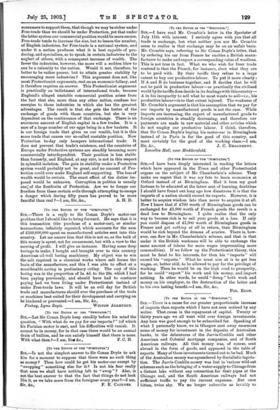ITO TILE EDITOR OP TIER " SPRCTAT011.1 SIR,—I have read
Mr. Crombie's letter in the Spectator of July 11th with interest. I entirely agree with you that all trade is exchange, but what neither you nor Mr. Crombie seem to realise is that exchange may be on an unfair basis. Mr. Crombie says, referring to Sir Conan Doyle's letter, that by ordering his car from France he enables a British manu- facturer to make and export a corresponding value of woollen's. This is not true in fact. What we who wish for freer trade contend is that the French, for instance, elect what they are to be paid with. By their tariffs they refuse to a large extent to buy our productive labour. To put it more clearly : If A and B do business together, and B decides that he will not be paid in productive labour—as practically the civilised world by its tariffs does decide in its dealings with this country— A in his incapacity to sell what he most wants to sell—i.e., his preductive labour—is to that extent injured. The weakness of Mr. Crombie's argument is that his assumption that we pay for our imports by manufactured goods is not the case. While imports are increasing, the export of manufactured goods to foreign countries is steadily decreasing, and therefore our payments are made in raw material and other articles which do not employ our productive labour. I think, therefore, that Sir Conan Doyle's buying his motor-car in Birmingham instead of in Paris is for' the good of this country, and most certainly for the good of the working class.—I am,
Lascelles Hall, near Huddersfield.






































 Previous page
Previous page